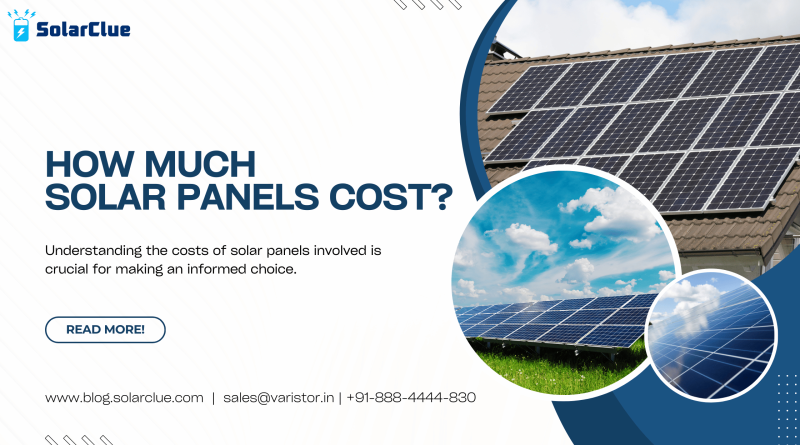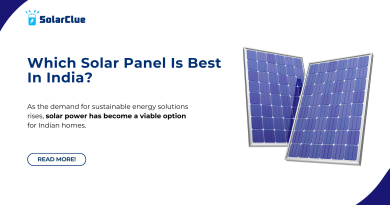How Much Solar Panels Cost?
Investing in solar panels is a significant decision for homeowners and businesses alike. Understanding the costs involved is crucial for making an informed choice. This blog breaks down the various factors affecting solar panel system prices in India, including panel types, system sizes, installation costs, permits, and incentives. Additionally, it provides insights into financing options, potential savings on electricity bills, and determining the payback period for a solar investment.
Table of Contents
Breaking Down the Cost of a Solar Panel System
Factors Influencing Solar Panel Costs
1. Panel Type: Different types of solar panels, such as monocrystalline, polycrystalline, and thin-film, have varying costs and efficiencies.
2. System Size: The larger the system, the higher the initial cost but greater the long-term savings.
3. Installation Costs: These include labor, mounting hardware, wiring, and other installation components.
4. Permits and Inspections: Government permits and inspections can add to the overall cost.
5. Incentives and Rebates: Government incentives can significantly reduce the upfront cost.
Average Cost Ranges for Different System Sizes
| System Size (kW) | Average Cost (INR) |
|---|---|
| 1 kW | ₹60,000 – ₹70,000 |
| 2 kW | ₹1,20,000 – ₹1,40,000 |
| 3 kW | ₹1,80,000 – ₹2,10,000 |
| 5 kW | ₹3,00,000 – ₹3,50,000 |
| 10 kW | ₹6,00,000 – ₹7,00,000 |
Impact of Government Incentives and Rebates
The Government of India offers various incentives and rebates to encourage solar energy adoption. These can include:
- Subsidies: Up to 30% subsidy on the cost of solar systems for residential users.
- Tax Benefits: Accelerated depreciation for businesses installing solar systems.
- Net Metering: Allows users to sell excess power back to the grid, reducing electricity bills.
Comparing Costs of Different Solar Panel Technologies
| Panel Type | Cost per Watt (INR) | Efficiency (%) | Lifespan (Years) |
|---|---|---|---|
| Monocrystalline | ₹40 – ₹50 | 15-20 | 25-30 |
| Polycrystalline | ₹30 – ₹40 | 13-16 | 20-25 |
| Thin-Film | ₹20 – ₹30 | 10-12 | 15-20 |
Estimating the Cost of Solar Panel Maintenance
Maintaining solar panels ensures they operate efficiently throughout their lifespan. The maintenance costs typically include:
- Cleaning: Regular cleaning to remove dust and debris.
- Inspection: Annual inspection to check for any issues.
- Repairs: Occasional repairs or replacement of components.
Average Annual Maintenance Cost
| System Size (kW) | Annual Maintenance Cost (INR) |
|---|---|
| 1-3 kW | ₹1,500 – ₹3,000 |
| 3-5 kW | ₹3,000 – ₹5,000 |
| 5-10 kW | ₹5,000 – ₹10,000 |
Factors Affecting the Payback Period for Solar Investments
Several factors influence the payback period of a solar investment, including:
- Initial Investment: Higher upfront costs may result in a longer payback period.
- Electricity Rates: Higher electricity rates lead to greater savings and a shorter payback period.
- Energy Consumption: Higher energy consumption increases savings from solar power.
- Government Incentives: Subsidies and tax benefits can significantly shorten the payback period.
Calculating the Payback Period
To calculate the payback period:
1. Determine Total Cost: Include the cost of the system, installation, permits, and any additional expenses.
2. Calculate Annual Savings: Based on your electricity usage and the system’s energy production.
3. Subtract Incentives: Deduct any government subsidies or rebates received.
Example Calculation
| Description | Amount (INR) |
|---|---|
| Total Cost | ₹3,00,000 |
| Annual Savings | ₹30,000 |
| Government Subsidy | ₹90,000 |
| Adjusted Total Cost | ₹2,10,000 |
| Payback Period | 7 years |
Economic Benefits of Solar Power
- Reduced Electricity Bills: Significant savings on monthly electricity expenses.
- Increased Property Value: Solar installations can enhance property value.
- Environmental Impact: Reduces carbon footprint and reliance on fossil fuels.
Financing Options for Solar Panels
| Financing Option | Description |
|---|---|
| Solar Loans | Borrow money to purchase the system |
| Solar Leases | Pay a monthly fee to use the system |
| Power Purchase Agreements (PPA) | Pay for the energy produced by the system |
Conclusion
Understanding the cost of solar panels involves considering various factors such as panel type, system size, installation, and government incentives. By evaluating these aspects and exploring financing options, you can make an informed decision about investing in solar energy, leading to significant long-term savings and environmental benefits.
FAQs
1. What is the average cost of a 5 kW solar system in India?
The average cost ranges from ₹3,00,000 to ₹3,50,000.
2. How much can I save on my electricity bill with solar panels?
Savings depend on your electricity usage and system size but can be significant.
3. Are there any government incentives for installing solar panels?
Yes, up to a 30% subsidy and various tax benefits.
4. What is the lifespan of solar panels?
Most solar panels have a lifespan of 25-30 years.
5. How do I calculate the payback period for a solar investment?
Calculate the total cost, subtract incentives, and divide by annual savings.




